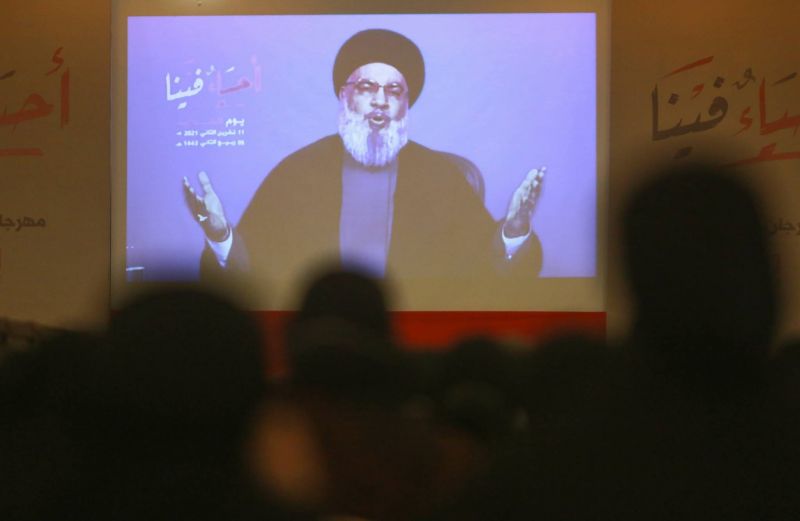
BEIRUT — Hezbollah leader Hassan Nasrallah on Thursday blamed Saudi Arabia for prompting the present diplomatic rift with Lebanon, but said he is “not concerned with escalating” the crisis. The party's secretary-general also rejected calls for the resignation of Lebanese Information Minister George Kurdahi, whose remarks on the war in Yemen are at the center of the ongoing dispute.
Here's what we know:
• During a televised speech to mark Hezbollah’s annual Martyrs’ Day, Nasrallah contended that Saudi Arabia “fabricated” the ongoing diplomatic spat by purposefully retrieving an interview with Kurdahi from before he took up office as information minister in order to “initiate this crisis.” Nasrallah added that Saudi Arabia’s reaction to the interview was “very very very exaggerated.” The comments were the Hezbollah secretary-general's first on the affair since the interview in question was broadcast on Oct. 25.
• Describing Kurdahi's controversial remarks as "calm and objective," the Hezbollah chief also reiterated his party's commitment to rejecting calls for the information minister's resignation.
• After Kurdahi's remarks were aired, several Gulf countries, led by Saudi Arabia, announced retaliatory measures against Lebanon, including the recall of ambassadors in Beirut and the expulsion of Lebanese diplomats. In the interview, the information minister had made controversial remarks, criticizing the war in Yemen and Riyadh’s involvement in it. Kurdahi had also expressed his support for Yemen's Houthi rebels, who are supported by Iran.
• Nasrallah on Thursday pointed out that many “American officials and Arab diplomats have previously described the war in Yemen in harsher terms than those the minister of information used” but that the reaction in the Gulf to these instances was much less harsh.
• However, Nasrallah also emphasized that his party is “not interested in escalating the tension,” asking that if Saudi Arabia has “an issue with the information minister” it deal “directly with the minister.”
• Since the crisis errupted, Saudi Arabia has stopped all imports from Lebanon, while Kuwait has reportedly tightened the terms under which it grants visas to Lebanese passport holders.
• The affair has also taken on the appearance of a tug-of-war over Hezbollah, a heavyweight in Lebanese politics, which is armed and financed by Iran, a major regional rival of Saudi Arabia.
• The head of Saudi diplomacy, Faisal bin Farhan, has said that “the problem goes far beyond the mere comments of a minister” and denounced “the hegemony of Hezbollah over Lebanon.”
• On Monday, the deputy Secretary-General of the Arab League, Houssam Zaki, during a visit to Lebanon, suggested that the rift could have been resolved quickly with Kurdahi’s resignation.
• Prime Minister Nagib Mikati has repeatedly suggested that the minister should act in the best interests of Lebanon and its expatriates living and working in Gulf countries, but has stopped short of explicitly asking Kurdahi to step down. The minister, supported by Hezbollah, refuses to resign.